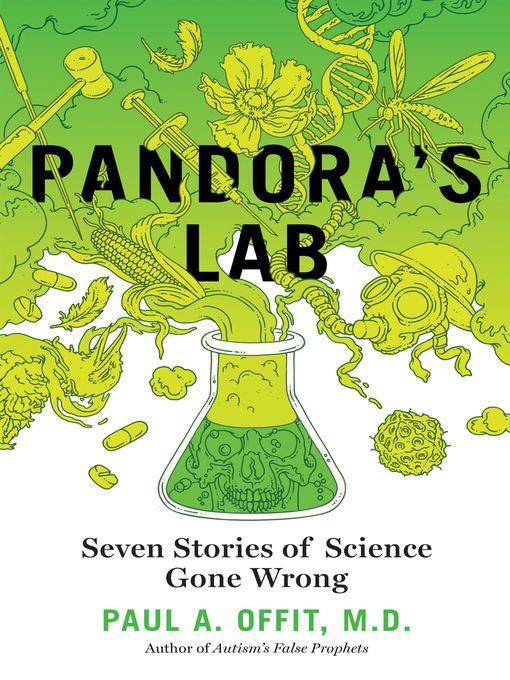
Pandora's Lab
Seven Stories of Science Gone Wrong
هفت داستان اشتباه علمی
کتاب های مرتبط
- اطلاعات
- نقد و بررسی
- دیدگاه کاربران
نقد و بررسی

February 27, 2017
Many dramatic scientific discoveries have lost their gloss or perhaps were never scientific to begin with, as pediatrician Offit (Bad Faith) shows in this heated denunciation of bad science. He outlines seven infamous discoveries that have had massive, detrimental unintended consequences. Opening with an account of the opium poppy, Offit traces opium’s development from its use in antiquity to the opioid epidemic of the 21st century. From there he moves through case studies on the false promise of margarine, the ways artificial fertilizer has poisoned water systems, the rise of the American eugenics movement, the horrors of the lobotomy, and the demonization of DDT. Offit’s seventh chapter details how three acclaimed scientists independently wandered down paths of pseudoscience, with dreadful results. He concludes by applying the lessons of his preceding chapters to new developments such as GMOs, autism cures, and e-cigarettes. The role of capitalism in scientific development and promotion does not come under scrutiny. In warning the public of pseudoscientific danger, Offit urges the public to examine available data; beware of quick fixes, fads, and charismatic health gurus; and understand that every advance comes at a price. These are all sensible suggestions, though pessimists will argue they’re unlikely to catch on. Agent: Gail Ross, Ross Yoon Agency.

February 1, 2017
Tales of scientific errors whose unintended consequences have been disastrous.Offit (Vaccinology and Pediatrics/Univ. of Pennsylvania School of Medicine; Bad Faith: When Religious Belief Undermines Modern Medicine, 2015, etc.), a doctor with a mission, once again does not hold back. In each chapter, he tells a different story of science gone wrong, beginning with the war on pain, stretching from opium through heroin to the addictive opioids now in the headlines. Then the author takes on scientists' mistaken belief that margarine, with its partially hydrogenated vegetable oils containing trans fats, was a heart-healthy alternative to butter. It was quite the opposite, writes Offit, and the process for converting unsaturated fats to trans fats "has probably caused more disease and death than any other man-made chemical reaction in history." The author then tells of Fritz Haber, the pesticide and fertilizer chemist behind the gas warfare of World War I and supervisor of production of Zyklon B, the gas used to kill millions of Jews. Haber won a Nobel Prize, as did Egas Moniz, the inventor of lobotomies. Offit's acidic comment: "At this point, it seems reasonable to wonder whether Nobel Prizes awarded in the first half of the 20th century came in Cracker Jack boxes." The author also takes up the eugenics movement, with its malicious notion of a master race, the erroneous banning of DDT following Rachel Carson's Silent Spring--in Offit's words, she was not a scientist but a polemicist--and the fallacious notion of the highly respected and double Nobelist Linus Pauling that megadoses of vitamin C could cure diseases. Each chapter concludes with a crisp take-home lesson, such as "beware the zeitgeist" and "beware the quick fix." Finally, Offit applies these lessons to a number of contemporary concerns, including e-cigarettes and cancer-screening programs, providing advice on how to think clearly about these issues and how to avoid the mistakes of the past. Another rousing, pull-no-punches piece from a physician set on educating the public about the fallibility of scientists.
COPYRIGHT(2017) Kirkus Reviews, ALL RIGHTS RESERVED.

April 1, 2017
Pediatrician and vocal child vaccination proponent Offit selects seven scientific discoveries that were once celebrated but have arguably "changed the world for the worse" and impact us today, such as opium (heroin), margarine (trans fats), industrial nitrogen fixation (chemical warfare), eugenics, lobotomy, DDT, and synthesized vitamins. The author clearly explains scientific processes and why they matter. The chapter on vitamins begins with Linus Pauling's embrace of megadosing of Vitamin C--megadosing is now linked to increased risk of cancer and heart disease--but veers into other Nobel Prize winners who, after earlier success, later clung to scientifically disproven theories. Indeed, there are Nobel-winners-gone-wrong throughout. Offit counters these tales with seven aphorisms to consider when encountering the next publicized breakthrough: it's all about the data, everything has a price, beware the zeitgeist, beware the quick fix, the dose makes the poison, be cautious about being cautious, and pay attention to the little man behind the curtain. A slew of relevant developments beyond the basic seven are discussed, including purported autism cures, GMOs, and the rhetoric of the last presidential campaign. VERDICT Timely and recommended for most public libraries; may even tempt readers who usually shun science.--Teresa R. Faust, Coll. of Central Florida
Copyright 2017 Library Journal, LLC Used with permission.

March 15, 2017
Offit, a pediatrician and virology expert, takes us through the history of science from a rather unusual perspective: exploring notable examples of scientific developments with ultimately disastrous consequences. Take the opium poppy: first distilled as a pain medication about six millennia ago by the Sumerians, it was embraced as a general-purpose medicine by the Greeks, the Romans, and the Chinese. A German company used it to produce aspirin, still a respected pain reliever. But the same company also created another miracle drug from the opium poppy; they called it heroin (based on the word heroic). And that led to morphine and oxycodone, products designed to relieve suffering, not kill millions. The author also discusses ammonia (developed to provide accessible synthetic fertilizer, but also responsible for the destruction of entire ecosystems), lobotomy, the vitamin and supplements industry, DDT, and eugenicsshowing, in each case, how well-meaning people went astray or how good ideas were adapted and perverted by other people. A fascinating and sometimes shocking look at how science can sometimes lead to disaster.(Reprinted with permission of Booklist, copyright 2017, American Library Association.)

























دیدگاه کاربران